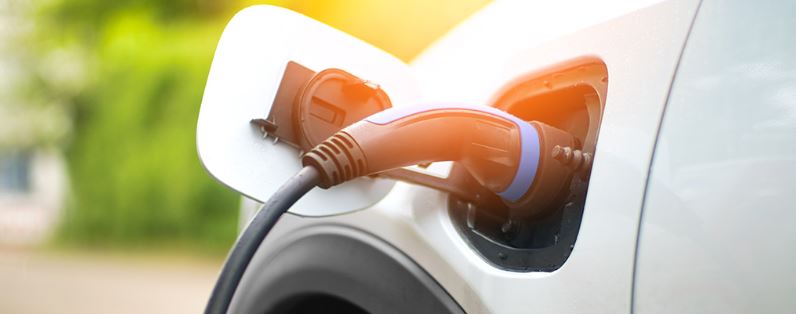


 2:24:22
2:24:22  2024-07-18
2024-07-18  1140
1140

Scientists have uncovered a new source of hazardous "forever chemical" pollution: the rechargeable lithium-ion batteries found in most electric vehicles.
Some lithium-ion battery technologies use a class of PFAS chemicals, or per-and polyfluoroalkyl substances, that helps make batteries less flammable and conduct electricity.
Scientists found high levels of these PFAS in air, water, snow, soil, and sediment samples near plants that make those chemicals in the US, Belgium, and France, according to a peer-reviewed study in the journal Nature Communications.
PFAS are known as "forever chemicals" because they build up quickly in the environment, people, and animals and don't break down for thousands of years. They've been linked to a host of health conditions, including liver damage, high cholesterol, low birth weights, and chronic kidney disease.
The findings underscore how switching to cleaner cars and renewable energy is key to solving the climate crisis, but comes with its own set of trade-offs that are still emerging and understudied.
While the environmental and health impacts of mining lithium and other minerals used in batteries, solar panels, wind turbines, and other technology are well documented, it's only now that researchers are uncovering lithium-ion batteries as a source of PFAS pollution.
"Slashing [carbon dioxide] emissions with innovations like electric cars is critical, but it shouldn't come with the side effect of increasing PFAS pollution," Jennifer Guelfo, an associate professor of environmental engineering at Texas Tech University and coauthor of the study, said in a statement.
It's an issue of global concern because lithium-ion batteries are used worldwide, the study said. The same class of PFAS has recently been detected at low levels in European and Chinese water, but the source of the pollution was unclear.
The specific class of PFAS that Guelfo's team found is called bis-perfluoroalkyl sulfonimides, or bis-FASIs. Scientists tested more than a dozen lithium-ion batteries used in EVs and consumer electronics like laptops, and found bis-FASIs at various concentrations.
It's hard to know just how widespread the chemicals are in specific lithium-ion batteries because there isn't enough research yet, Lee Ferguson, associate professor of environmental engineering at Duke University and coauthor of the study, said.
Guelfo said bis-FASIs is comparable to "older notorious" chemicals like PFOA, in part because they are extremely difficult to degrade and studies show the chemicals change the behavior of aquatic organisms at low concentrations. PFOA has been phased out of production in the US but continue to pollute drinking water.
The study was the first "cradle-to-grave" evaluation of the environmental impacts of bis-FASI use in lithium-ion batteries. The effects of bis-FASIs in humans hasn't been studied yet.
The scientists detected bis-FASIs chemicals at parts per billion levels – much higher than the limits the Environmental Protection Agency set for PFAS in drinking water in April. Strategies to get rid of PFAS in drinking water can also remove bis-FASIs, the study said, which should become more widely adopted due to EPA's regulations. However, chemical makers and some water utilities have challenged the agency in court.
Other routes of exposure to bis-FASIs exist. Air emissions data suggest the chemicals can travel to areas far from manufacturing sites. They can also leach into the environment from landfills, where the majority of lithium-ion batteries end up.
The study said only about 5 percent of lithium-ion batteries are recycled, and by 2040, there could be some 8 million tons of lithium-ion battery waste.
Guelfo said scientists, engineers, manufacturers, and policymakers need to develop battery technology and recycling solutions that don't exacerbate PFAS pollution.
"We need to be carefully evaluating these chemicals that are being used in sustainable energy infrastructure," Guelfo said. "We should be evaluating them now before it becomes a more widespread problem. We an opportunity to really maximize the idea of sustainability."
Companies including 3M, Solvay, and Arkema either hold patents for bis-FASIs or advertise its production or use, the study said. Scientists focused their research on areas near the companies' manufacturing plants in Minnesota, Kentucky, Antwerp, Belgium, and Salindres, France.
3M has manufactured PFAS for decades and last year agreed to a $10 billion settlement with US cities and towns over their claims that the company contaminated drinking water with forever chemicals. 3M said it will exit all PFAS manufacturing by the end of 2025.
The company's settlement followed another agreement by Chemours, DuPont and Corteva to pay $1.19 billion to help resolve thousands of lawsuits.
Reality Of Islam |
|

This is the

A computer

Auburn Univ

Poisoning i
 9:3:43
9:3:43
 2018-11-05
2018-11-05
10 benefits of Marriage in Islam
 7:5:22
7:5:22
 2019-04-08
2019-04-08
benefits of reciting surat yunus, hud &
 9:45:7
9:45:7
 2018-12-24
2018-12-24
advantages & disadvantages of divorce
 11:35:12
11:35:12
 2018-06-10
2018-06-10
 6:0:51
6:0:51
 2018-10-16
2018-10-16
 2:33:4
2:33:4
 2023-02-15
2023-02-15
 8:3:0
8:3:0
 2018-06-21
2018-06-21
 6:28:21
6:28:21
 2022-12-20
2022-12-20
 11:11:59
11:11:59
 2023-02-01
2023-02-01
 10:47:11
10:47:11
 2022-11-22
2022-11-22
 12:10:56
12:10:56
 2022-11-17
2022-11-17
 10:35:40
10:35:40
 2022-05-26
2022-05-26
 5:41:46
5:41:46
 2023-03-18
2023-03-18
| LATEST |